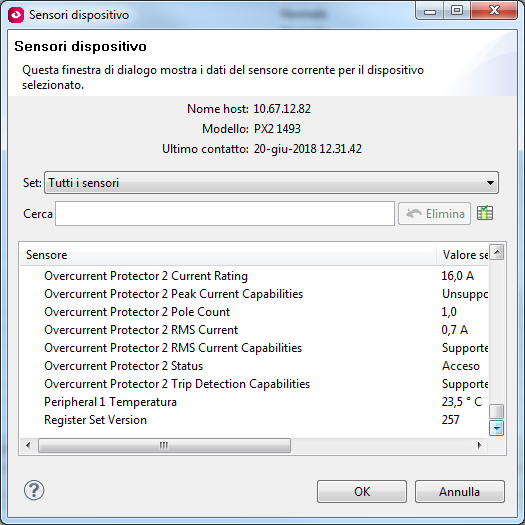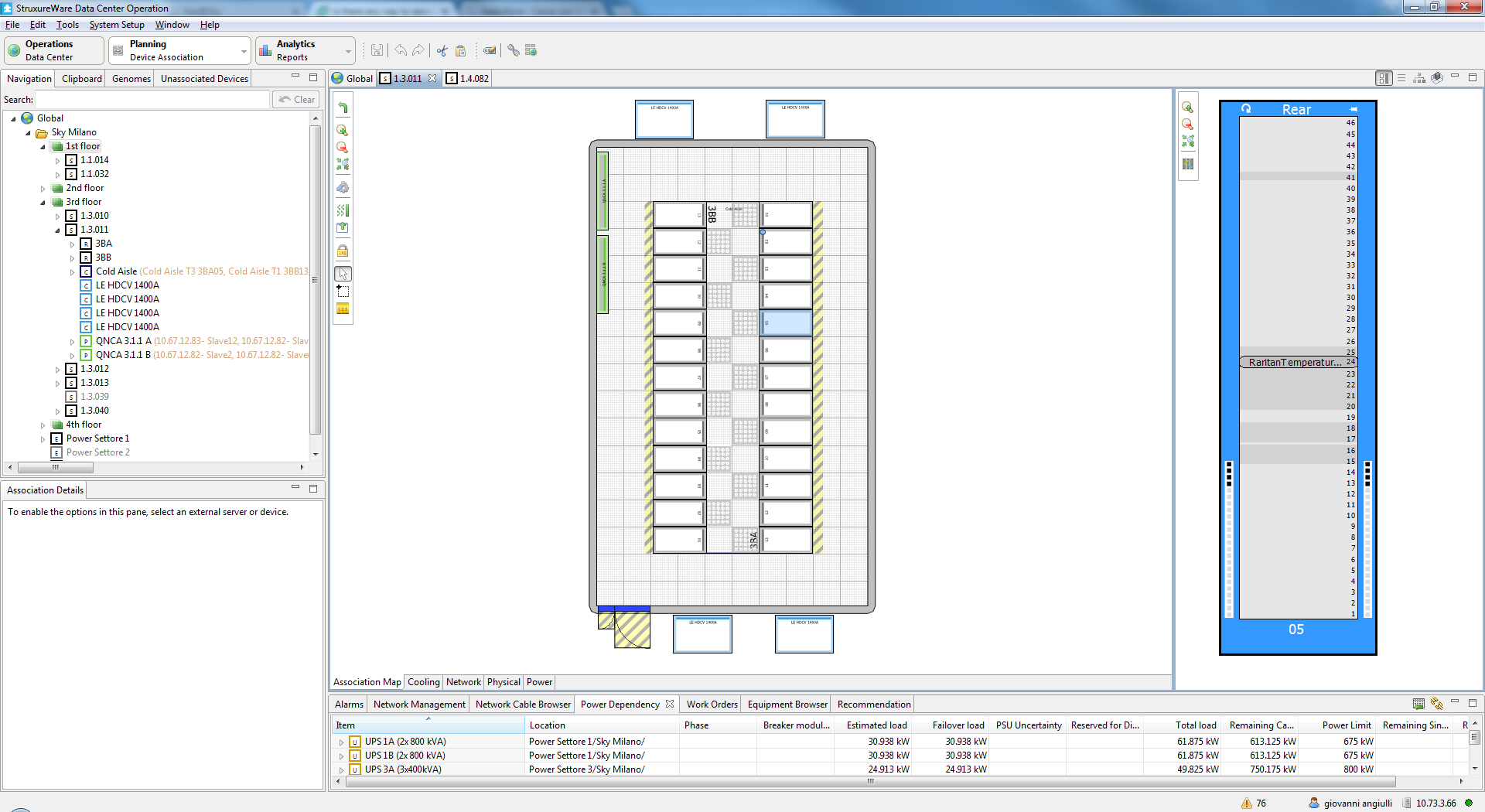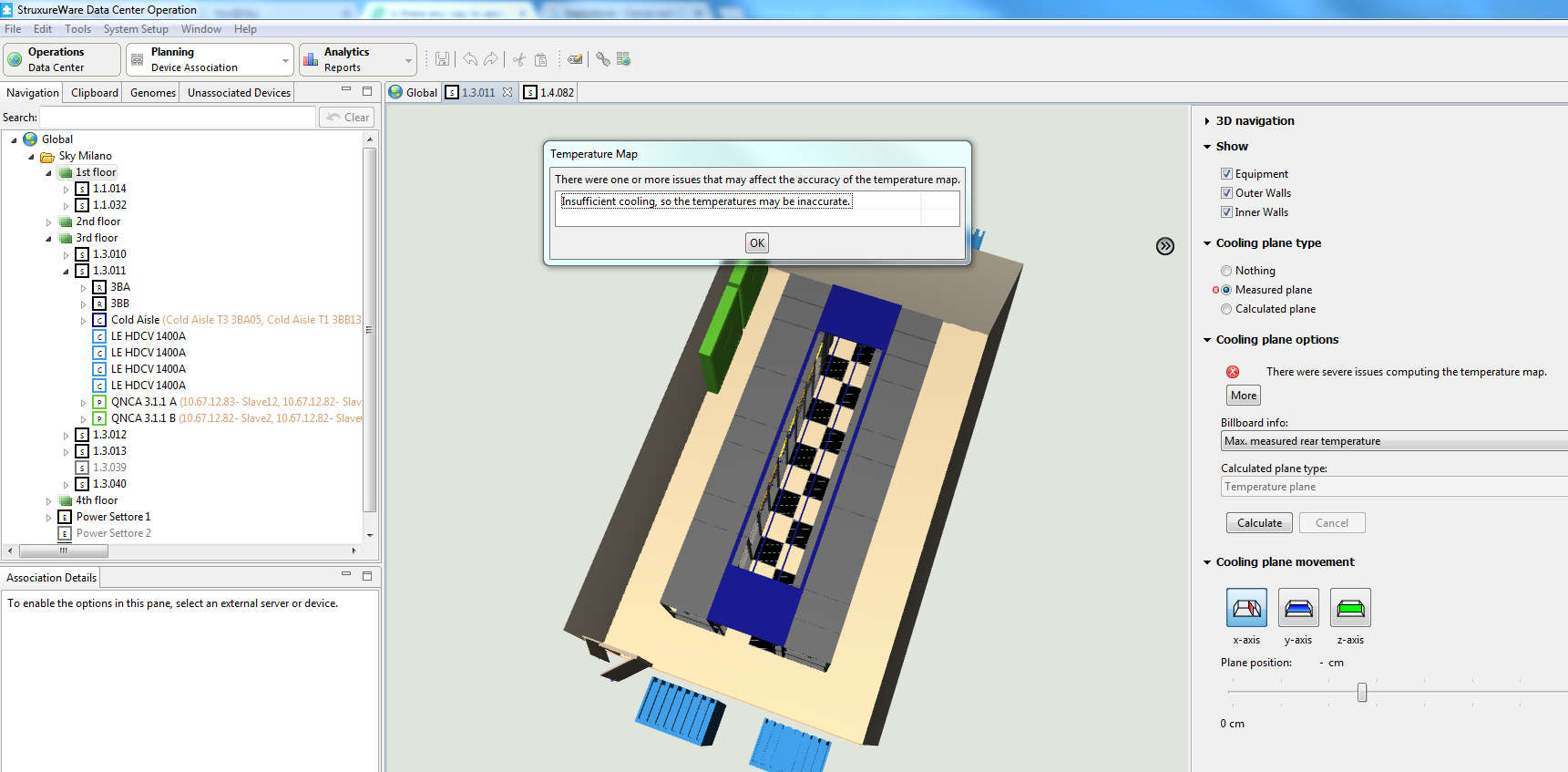Ask Me About Webinar: Data Center Assets - Modeling, Cooling, and CFD Simulation
Join our 30-minute expert session on July 10, 2025 (9:00 AM & 5:00 PM CET), to explore Digital Twins, cooling simulations, and IT infrastructure modeling. Learn how to boost resiliency and plan power capacity effectively. Register now to secure your spot!
is there any way to associate 3rd party temperature sensor to dco?
EcoStruxure IT forum
Schneider Electric support forum about installation and configuration for DCIM including EcoStruxure IT Expert, IT Advisor, Data Center Expert, and NetBotz
- Mark Topic as New
- Mark Topic as Read
- Float this Topic for Current User
- Bookmark
- Subscribe
- Mute
- Printer Friendly Page
- Mark as New
- Bookmark
- Subscribe
- Mute
- Permalink
- Email to a Friend
- Report Inappropriate Content
Link copied. Please paste this link to share this article on your social media post.
Posted: 2020-07-04 07:19 PM . Last Modified: 2024-04-04 11:15 PM
is there any way to associate 3rd party temperature sensor to dco?
is there any way to associate 3rd party temperature sensor to dco?
(CID:132654768)
Link copied. Please paste this link to share this article on your social media post.
- Mark as New
- Bookmark
- Subscribe
- Mute
- Permalink
- Email to a Friend
- Report Inappropriate Content
Link copied. Please paste this link to share this article on your social media post.
Posted: 2020-07-04 07:19 PM . Last Modified: 2024-04-04 11:15 PM
Hi Giovanni,
Wondering if you are seeing the temperature sensor info in DCE, and if possible to share screen capture (IP and other sensitive info may be masked).
If you see the temperature sensor information in DCE and if not coming to DCO (expected to be shown in Planning Device Association mode > Monitoring > "DCE server" > ), then it might basically be DDF related issue. New ddf's can be request here: http://sxwhelpcenter.ecostruxureit.com/devices.
Kind regards
(CID:132654865)
Link copied. Please paste this link to share this article on your social media post.
- Mark as New
- Bookmark
- Subscribe
- Mute
- Permalink
- Email to a Friend
- Report Inappropriate Content
Link copied. Please paste this link to share this article on your social media post.
Posted: 2020-07-04 07:19 PM . Last Modified: 2024-04-04 11:15 PM
Hello Jef,
I have a chain of Raritan PDU connected to DCE via Modbus TCP. One single IP configured on the first PDU in the chain. Every PDU have one temperature sensor connected.
I'm able to see the temperature value in DCE using command "right click" on PDU and "view sensor device" as below

I have created the virtual sensor for the temperature in DCE

and I have associate in DCO the temp virtual sensor to one temperature device I found in the Genoma using Planning Device Association mode > Monitoring > "DCE server"

Now I'm unable to view the measured plan in 3D navigation because of the error message you can see in image below

Do you think it can be a DDF issue?
thanks and regards
(CID:132654900)
Link copied. Please paste this link to share this article on your social media post.
- Mark as New
- Bookmark
- Subscribe
- Mute
- Permalink
- Email to a Friend
- Report Inappropriate Content
Link copied. Please paste this link to share this article on your social media post.
Posted: 2020-07-04 07:19 PM . Last Modified: 2024-04-04 11:15 PM
Hi Giovanni,
Many thanks for the additional info - unfortunately this network port sharing configuration is not supported in DCO. I guess you might only be able to see the device sensor information (in DCO) for the first rack-pdu with configured IP.
Virtual temperature sensors are not designed to be used in DCO.
Kind regards
(CID:132654916)
Link copied. Please paste this link to share this article on your social media post.
- Mark as New
- Bookmark
- Subscribe
- Mute
- Permalink
- Email to a Friend
- Report Inappropriate Content
Link copied. Please paste this link to share this article on your social media post.
Posted: 2020-07-04 07:19 PM . Last Modified: 2024-04-04 11:15 PM
Hi Jeff, as a single NetBotz device supports multiple temp sensors, I guess that this is a DDF challenge as it relates to DCO? Or am I missing something?
Cheers
(CID:134695820)
Link copied. Please paste this link to share this article on your social media post.
- Mark as New
- Bookmark
- Subscribe
- Mute
- Permalink
- Email to a Friend
- Report Inappropriate Content
Link copied. Please paste this link to share this article on your social media post.
Posted: 2020-07-04 07:19 PM . Last Modified: 2024-04-04 11:15 PM
You are correct as far as I know. the DDF would have to be setup to make each of the temp sensors visible to DCO as temp sensors. Seeing multiple temp sensors is not limited to botz devices.
Support for daisy chained devices is currently part of the ecostruxure it expert gateway, so improvements in this capability are coming to DCO.
As Jef already mentioned DCO does not support virtual sensors from DCE.
Regards
Greg Sterling
(CID:134696425)
Link copied. Please paste this link to share this article on your social media post.
- Mark as New
- Bookmark
- Subscribe
- Mute
- Permalink
- Email to a Friend
- Report Inappropriate Content
Link copied. Please paste this link to share this article on your social media post.
Posted: 2020-07-04 07:19 PM . Last Modified: 2024-04-04 11:15 PM
Hi Giovanni
Are you seeing the virtual sensors in DCO?
In Australia, we solved a similar issue (but we wanted power readings as well as temp) a long time ago by using a locally developed gateway product that reads all the values from the first rPDU and then "unpacks" the readings and present these to DCE, via SNMP, as multiple device IPs, each with appropriate temp sensors. So we needed an IP and a DCE node license per rPDU - no problem for this customer.
But I feel that your's is simply a DDF problem that can be solved with an adjustment to the DCE modbus DDF. I'm saying this because you've said nothing about the rPDU power readings. If you want power as well I guess you'll need something like the gateway or wait for DCE/DCO support for daisy chained rPDUs.
If it's just temp, the single modbus/TCP Raritan rPDU should be OK to present to DCO as a single device but with multiple temp sensors, which you can then drag and drop where they are physically located.
I hope this makes sense.
The gateway BTW is a licensed product that requires $/Euro investment
Cheers
Ed
(CID:132655426)
Link copied. Please paste this link to share this article on your social media post.
- Mark as New
- Bookmark
- Subscribe
- Mute
- Permalink
- Email to a Friend
- Report Inappropriate Content
Link copied. Please paste this link to share this article on your social media post.
Posted: 2020-07-04 07:19 PM . Last Modified: 2024-04-04 11:15 PM
Hello Ed,
I'm really sorry for my late answer. Yes we need also power reading not only temperature. I can read both in DCE for the whole PDU chain but it seems not possible to drag and drop the sensor where it is located in DCO.
I tried a lot to get a reviewed DDF with local team and support team without result.
Regards
(CID:134683814)
Link copied. Please paste this link to share this article on your social media post.
- Mark as New
- Bookmark
- Subscribe
- Mute
- Permalink
- Email to a Friend
- Report Inappropriate Content
Link copied. Please paste this link to share this article on your social media post.
Posted: 2020-07-04 07:20 PM . Last Modified: 2023-10-22 04:40 AM

This question is closed for comments. You're welcome to start a new topic if you have further comments on this issue.
Link copied. Please paste this link to share this article on your social media post.
Create your free account or log in to subscribe to the board - and gain access to more than 10,000+ support articles along with insights from experts and peers.
